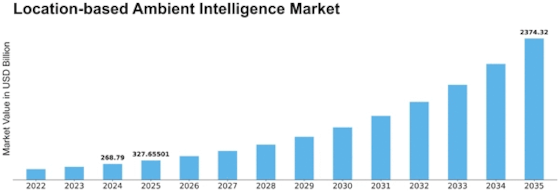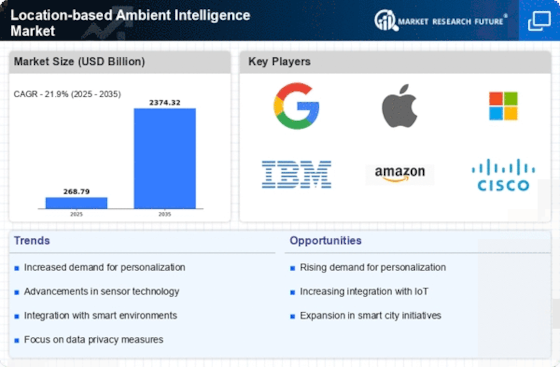-
EXECUTIVE SUMMARY
-
MARKET INTRODUCTION
-
Definition
-
Scope of the Study
- Research Objective
- Assumptions
- Limitations
-
RESEARCH METHODOLOGY
-
Overview
-
Data Mining
-
Secondary Research
-
Primary Research
- Primary Interviews and Information Gathering Process
- Breakdown of Primary Respondents
-
Forecasting Modality
-
Market Size Estimation
- Bottom-Up Approach
- Top-Down Approach
-
Data Triangulation
-
Validation
-
MARKET DYNAMICS
-
Overview
-
Drivers
-
Restraints
-
Opportunities
-
MARKET FACTOR ANALYSIS
-
Value Chain Analysis
-
Porter’s Five Forces Analysis
- Bargaining Power of Suppliers
- Bargaining Power of Buyers
- Threat of New Entrants
- Threat of Substitutes
- Intensity of Rivalry
-
COVID-19 Impact Analysis
- Market Impact Analysis
- Regional Impact
- Opportunity and Threat Analysis
-
GLOBAL LOCATION-BASED AMBIENT INTELLIGENCE MARKET, BY COMPONENT
-
Overview
-
Virtual Reality
-
Hardware
-
Software
-
Wearables
-
mHealth
-
Smart Homes
-
Lighting controls
-
Security and Access control
-
HVAC Controls
-
Entertainment controls
-
Others
-
GLOBAL LOCATION-BASED AMBIENT INTELLIGENCE MARKET, BY TECHNOLOGY
-
Overview
-
Bluetooth Low Energy
-
RFID
-
Sensors Ambient Light Sensor
-
Software agents
-
Affective computing
-
Nanotechnology
-
Biometrics
-
Others
-
GLOBAL LOCATION-BASED AMBIENT INTELLIGENCE MARKET, BY END-USER
-
Overview
-
Residential
-
Retail
-
Healthcare
-
Industrial
-
Office Building
-
Automotive
-
Others
-
GLOBAL LOCATION-BASED AMBIENT INTELLIGENCE MARKET, BY REGION
-
Overview
-
North America
- U.S.
- Canada
-
Europe
- Germany
- France
- U.K
- Italy
- Spain
- Rest of Europe
-
Asia-Pacific
- China
- India
- Japan
- South Korea
- Australia
- Rest of Asia-Pacific
-
Rest of the World
- Middle East
- Africa
- Latin America
-
COMPETITIVE LANDSCAPE
-
Overview
-
Competitive Analysis
-
Market Share Analysis
-
Major Growth Strategy in the Global Location-based Ambient Intelligence Market,
-
Competitive Benchmarking
-
Leading Players in Terms of Number of Developments in the Global Location-based Ambient Intelligence Market,
-
Key developments and Growth Strategies
- New Component Launch/Technology Deployment
- Merger & Acquisitions
- Joint Ventures
-
Major Players Financial Matrix
- Sales & Operating Income, 2022
- Major Players R&D Expenditure. 2022
-
COMPANY PROFILES
-
Infosys Limited (India).
- Company Overview
- Financial Overview
- Components Offered
- Key Developments
- SWOT Analysis
- Key Strategies
-
Huawei Technologies Co.,Ltd.(China)
- Company Overview
- Financial Overview
- Components Offered
- Key Developments
- SWOT Analysis
- Key Strategies
-
SAMSUNG (South Korea)
- Company Overview
- Financial Overview
- Components Offered
- Key Developments
- SWOT Analysis
- Key Strategies
-
ABB (Switzerland)
- Company Overview
- Financial Overview
- Components Offered
- Key Developments
- SWOT Analysis
- Key Strategies
-
Honeywell International Inc. (U.S.)
- Company Overview
- Financial Overview
- Components Offered
- Key Developments
- SWOT Analysis
- Key Strategies
-
MEDIC4ALL (AUSTRALIA).
- Company Overview
- Financial Overview
- Components Offered
- Key Developments
- SWOT Analysis
- Key Strategies
-
Assisted Living Technologies, Inc. (U.S.)
- Company Overview
- Financial Overview
- Components Offered
- Key Developments
- SWOT Analysis
- Key Strategies
-
Vita Group Holdings Limited (U.K.)
- Company Overview
- Financial Overview
- Components Offered
- Key Developments
- SWOT Analysis
- Key Strategies
-
Johnson Controls. (Ireland)
- Company Overview
- Financial Overview
- Components Offered
- Key Developments
- SWOT Analysis
- Key Strategies
-
Chubb Fire & Security (U.K.)
- Company Overview
- Financial Overview
- Components Offered
- Key Developments
- SWOT Analysis
- Key Strategies
-
Doro AB (Sweden)
- Company Overview
- Financial Overview
- Components Offered
- Key Developments
- SWOT Analysis
- Key Strategies
-
Nokia (Finland)
- Company Overview
- Financial Overview
- Components Offered
- Key Developments
- SWOT Analysis
- Key Strategies
-
Google (U.S.)
- Company Overview
- Financial Overview
- Components Offered
- Key Developments
- SWOT Analysis
- Key Strategies
-
HTC Corporation (Taiwan)
- Company Overview
- Financial Overview
- Components Offered
- Key Developments
- SWOT Analysis
- Key Strategies
-
HTC GLOBAL SERVICES (U.S.)
- Company Overview
- Financial Overview
- Components Offered
- Key Developments
- SWOT Analysis
- Key Strategies
-
Schneider Electric (France)
- Company Overview
- Financial Overview
- Components Offered
- Key Developments
- SWOT Analysis
- Key Strategies
-
Siemens (Germany)
- Company Overview
- Financial Overview
- Components Offered
- Key Developments
- SWOT Analysis
- Key Strategies
-
APPENDIX
-
References
-
Related Reports
-
-
LIST OF TABLES
-
GLOBAL LOCATION-BASED AMBIENT INTELLIGENCE MARKET, SYNOPSIS, 2018-2032
-
GLOBAL LOCATION-BASED AMBIENT INTELLIGENCE MARKET, ESTIMATES & FORECAST, 2018-2032 (USD BILLION)
-
GLOBAL LOCATION-BASED AMBIENT INTELLIGENCE MARKET, BY COMPONENT, 2018-2032 (USD BILLION)
-
GLOBAL LOCATION-BASED AMBIENT INTELLIGENCE MARKET, BY TECHNOLOGY, 2018-2032 (USD BILLION)
-
GLOBAL LOCATION-BASED AMBIENT INTELLIGENCE MARKET, BY END-USER, 2018-2032 (USD BILLION)
-
NORTH AMERICA LOCATION-BASED AMBIENT INTELLIGENCE MARKET, BY COMPONENT, 2018-2032 (USD BILLION)
-
NORTH AMERICA LOCATION-BASED AMBIENT INTELLIGENCE MARKET, BY TECHNOLOGY, 2018-2032 (USD BILLION)
-
NORTH AMERICA LOCATION-BASED AMBIENT INTELLIGENCE MARKET, BY END-USER, 2018-2032 (USD BILLION)
-
NORTH AMERICA LOCATION-BASED AMBIENT INTELLIGENCE MARKET, BY COUNTRY, 2018-2032 (USD BILLION)
-
U.S. LOCATION-BASED AMBIENT INTELLIGENCE MARKET, BY COMPONENT, 2018-2032 (USD BILLION)
-
U.S. LOCATION-BASED AMBIENT INTELLIGENCE MARKET, BY TECHNOLOGY, 2018-2032 (USD BILLION)
-
U.S. LOCATION-BASED AMBIENT INTELLIGENCE MARKET, BY END-USER, 2018-2032 (USD BILLION)
-
CANADA LOCATION-BASED AMBIENT INTELLIGENCE MARKET, BY COMPONENT, 2018-2032 (USD BILLION)
-
CANADA LOCATION-BASED AMBIENT INTELLIGENCE MARKET, BY TECHNOLOGY, 2018-2032 (USD BILLION)
-
CANADA LOCATION-BASED AMBIENT INTELLIGENCE MARKET, BY END-USER, 2018-2032 (USD BILLION)
-
EUROPE LOCATION-BASED AMBIENT INTELLIGENCE MARKET, BY COMPONENT, 2018-2032 (USD BILLION)
-
EUROPE LOCATION-BASED AMBIENT INTELLIGENCE MARKET, BY TECHNOLOGY, 2018-2032 (USD BILLION)
-
EUROPE LOCATION-BASED AMBIENT INTELLIGENCE MARKET, BY END-USER, 2018-2032 (USD BILLION)
-
EUROPE LOCATION-BASED AMBIENT INTELLIGENCE MARKET, BY COUNTRY, 2018-2032 (USD BILLION)
-
GERMANY LOCATION-BASED AMBIENT INTELLIGENCE MARKET, BY COMPONENT, 2018-2032 (USD BILLION)
-
GERMANY LOCATION-BASED AMBIENT INTELLIGENCE MARKET, BY TECHNOLOGY, 2018-2032 (USD BILLION)
-
GERMANY LOCATION-BASED AMBIENT INTELLIGENCE MARKET, BY END-USER, 2018-2032 (USD BILLION)
-
FRANCE LOCATION-BASED AMBIENT INTELLIGENCE MARKET, BY COMPONENT, 2018-2032 (USD BILLION)
-
FRANCE LOCATION-BASED AMBIENT INTELLIGENCE MARKET, BY TECHNOLOGY, 2018-2032 (USD BILLION)
-
FRANCE LOCATION-BASED AMBIENT INTELLIGENCE MARKET, BY END-USER, 2018-2032 (USD BILLION)
-
ITALY LOCATION-BASED AMBIENT INTELLIGENCE MARKET, BY COMPONENT, 2018-2032 (USD BILLION)
-
ITALY LOCATION-BASED AMBIENT INTELLIGENCE MARKET, BY TECHNOLOGY, 2018-2032 (USD BILLION)
-
ITALY LOCATION-BASED AMBIENT INTELLIGENCE MARKET, BY END-USER, 2018-2032 (USD BILLION)
-
SPAIN LOCATION-BASED AMBIENT INTELLIGENCE MARKET, BY COMPONENT, 2018-2032 (USD BILLION)
-
SPAIN LOCATION-BASED AMBIENT INTELLIGENCE MARKET, BY TECHNOLOGY, 2018-2032 (USD BILLION)
-
SPAIN LOCATION-BASED AMBIENT INTELLIGENCE MARKET, BY END-USER, 2018-2032 (USD BILLION)
-
U.K LOCATION-BASED AMBIENT INTELLIGENCE MARKET, BY COMPONENT, 2018-2032 (USD BILLION)
-
U.K LOCATION-BASED AMBIENT INTELLIGENCE MARKET, BY TECHNOLOGY, 2018-2032 (USD BILLION)
-
U.K LOCATION-BASED AMBIENT INTELLIGENCE MARKET, BY END-USER, 2018-2032 (USD BILLION)
-
REST OF EUROPE LOCATION-BASED AMBIENT INTELLIGENCE MARKET, BY COMPONENT, 2018-2032 (USD BILLION)
-
REST OF EUROPE LOCATION-BASED AMBIENT INTELLIGENCE MARKET, BY TECHNOLOGY, 2018-2032 (USD BILLION)
-
REST OF EUROPE LOCATION-BASED AMBIENT INTELLIGENCE MARKET, BY END-USER, 2018-2032 (USD BILLION)
-
ASIA PACIFIC LOCATION-BASED AMBIENT INTELLIGENCE MARKET, BY COMPONENT, 2018-2032 (USD BILLION)
-
ASIA PACIFIC LOCATION-BASED AMBIENT INTELLIGENCE MARKET, BY TECHNOLOGY, 2018-2032 (USD BILLION)
-
ASIA PACIFIC LOCATION-BASED AMBIENT INTELLIGENCE MARKET, BY END-USER, 2018-2032 (USD BILLION)
-
ASIA PACIFIC LOCATION-BASED AMBIENT INTELLIGENCE MARKET, BY COUNTRY, 2018-2032 (USD BILLION)
-
JAPAN LOCATION-BASED AMBIENT INTELLIGENCE MARKET, BY COMPONENT, 2018-2032 (USD BILLION)
-
JAPAN LOCATION-BASED AMBIENT INTELLIGENCE MARKET, BY TECHNOLOGY, 2018-2032 (USD BILLION)
-
JAPAN LOCATION-BASED AMBIENT INTELLIGENCE MARKET, BY END-USER, 2018-2032 (USD BILLION)
-
CHINA LOCATION-BASED AMBIENT INTELLIGENCE MARKET, BY COMPONENT, 2018-2032 (USD BILLION)
-
CHINA LOCATION-BASED AMBIENT INTELLIGENCE MARKET, BY TECHNOLOGY, 2018-2032 (USD BILLION)
-
CHINA LOCATION-BASED AMBIENT INTELLIGENCE MARKET, BY END-USER, 2018-2032 (USD BILLION)
-
INDIA LOCATION-BASED AMBIENT INTELLIGENCE MARKET, BY COMPONENT, 2018-2032 (USD BILLION)
-
INDIA LOCATION-BASED AMBIENT INTELLIGENCE MARKET, BY TECHNOLOGY, 2018-2032 (USD BILLION)
-
INDIA LOCATION-BASED AMBIENT INTELLIGENCE MARKET, BY END-USER, 2018-2032 (USD BILLION)
-
AUSTRALIA LOCATION-BASED AMBIENT INTELLIGENCE MARKET, BY COMPONENT, 2018-2032 (USD BILLION)
-
AUSTRALIA LOCATION-BASED AMBIENT INTELLIGENCE MARKET, BY TECHNOLOGY, 2018-2032 (USD BILLION)
-
AUSTRALIA LOCATION-BASED AMBIENT INTELLIGENCE MARKET, BY END-USER, 2018-2032 (USD BILLION)
-
SOUTH KOREA LOCATION-BASED AMBIENT INTELLIGENCE MARKET, BY COMPONENT, 2018-2032 (USD BILLION)
-
SOUTH KOREA LOCATION-BASED AMBIENT INTELLIGENCE MARKET, BY TECHNOLOGY, 2018-2032 (USD BILLION)
-
SOUTH KOREA LOCATION-BASED AMBIENT INTELLIGENCE MARKET, BY END-USER, 2018-2032 (USD BILLION)
-
REST OF ASIA-PACIFIC LOCATION-BASED AMBIENT INTELLIGENCE MARKET, BY COMPONENT, 2018-2032 (USD BILLION)
-
REST OF ASIA-PACIFIC LOCATION-BASED AMBIENT INTELLIGENCE MARKET, BY TECHNOLOGY, 2018-2032 (USD BILLION)
-
REST OF ASIA-PACIFIC LOCATION-BASED AMBIENT INTELLIGENCE MARKET, BY END-USER, 2018-2032 (USD BILLION)
-
REST OF WORLD LOCATION-BASED AMBIENT INTELLIGENCE MARKET, BY COMPONENT, 2018-2032 (USD BILLION)
-
REST OF WORLD LOCATION-BASED AMBIENT INTELLIGENCE MARKET, BY TECHNOLOGY, 2018-2032 (USD BILLION)
-
REST OF WORLD LOCATION-BASED AMBIENT INTELLIGENCE MARKET, BY END-USER, 2018-2032 (USD BILLION)
-
REST OF WORLD LOCATION-BASED AMBIENT INTELLIGENCE MARKET, BY COUNTRY, 2018-2032 (USD BILLION)
-
MIDDLE EAST LOCATION-BASED AMBIENT INTELLIGENCE MARKET, BY COMPONENT, 2018-2032 (USD BILLION)
-
MIDDLE EAST LOCATION-BASED AMBIENT INTELLIGENCE MARKET, BY TECHNOLOGY, 2018-2032 (USD BILLION)
-
MIDDLE EAST LOCATION-BASED AMBIENT INTELLIGENCE MARKET, BY END-USER, 2018-2032 (USD BILLION)
-
AFRICA LOCATION-BASED AMBIENT INTELLIGENCE MARKET, BY COMPONENT, 2018-2032 (USD BILLION)
-
AFRICA LOCATION-BASED AMBIENT INTELLIGENCE MARKET, BY TECHNOLOGY, 2018-2032 (USD BILLION)
-
AFRICA LOCATION-BASED AMBIENT INTELLIGENCE MARKET, BY END-USER, 2018-2032 (USD BILLION)
-
LATIN AMERICA LOCATION-BASED AMBIENT INTELLIGENCE MARKET, BY COMPONENT, 2018-2032 (USD BILLION)
-
LATIN AMERICA LOCATION-BASED AMBIENT INTELLIGENCE MARKET, BY TECHNOLOGY, 2018-2032 (USD BILLION)
-
LATIN AMERICA LOCATION-BASED AMBIENT INTELLIGENCE MARKET, BY END-USER, 2018-2032 (USD BILLION)
-
LIST OF FIGURES
-
RESEARCH PROCESS
-
MARKET STRUCTURE FOR THE GLOBAL LOCATION-BASED AMBIENT INTELLIGENCE MARKET
-
MARKET DYNAMICS FOR THE GLOBAL LOCATION-BASED AMBIENT INTELLIGENCE MARKET
-
GLOBAL LOCATION-BASED AMBIENT INTELLIGENCE MARKET, SHARE (%), BY COMPONENT, 2022
-
GLOBAL LOCATION-BASED AMBIENT INTELLIGENCE MARKET, SHARE (%), BY TECHNOLOGY, 2022
-
GLOBAL LOCATION-BASED AMBIENT INTELLIGENCE MARKET, SHARE (%), BY END-USER, 2022
-
GLOBAL LOCATION-BASED AMBIENT INTELLIGENCE MARKET, SHARE (%), BY REGION, 2022
-
NORTH AMERICA: LOCATION-BASED AMBIENT INTELLIGENCE MARKET, SHARE (%), BY REGION, 2022
-
EUROPE: LOCATION-BASED AMBIENT INTELLIGENCE MARKET, SHARE (%), BY REGION, 2022
-
ASIA-PACIFIC: LOCATION-BASED AMBIENT INTELLIGENCE MARKET, SHARE (%), BY REGION, 2022
-
REST OF THE WORLD: LOCATION-BASED AMBIENT INTELLIGENCE MARKET, SHARE (%), BY REGION, 2022
-
GLOBAL LOCATION-BASED AMBIENT INTELLIGENCE MARKET: COMPANY SHARE ANALYSIS, 2022 (%)
-
INFOSYS LIMITED (INDIA).: FINANCIAL OVERVIEW SNAPSHOT
-
INFOSYS LIMITED (INDIA).: SWOT ANALYSIS
-
HUAWEI TECHNOLOGIES CO.,LTD.(CHINA): FINANCIAL OVERVIEW SNAPSHOT
-
HUAWEI TECHNOLOGIES CO.,LTD.(CHINA): SWOT ANALYSIS
-
SAMSUNG (SOUTH KOREA): FINANCIAL OVERVIEW SNAPSHOT
-
SAMSUNG (SOUTH KOREA): SWOT ANALYSIS
-
ABB (SWITZERLAND): FINANCIAL OVERVIEW SNAPSHOT
-
ABB (SWITZERLAND): SWOT ANALYSIS
-
HONEYWELL INTERNATIONAL INC. (U.S.).: FINANCIAL OVERVIEW SNAPSHOT
-
HONEYWELL INTERNATIONAL INC. (U.S.).: SWOT ANALYSIS
-
MEDIC4ALL (AUSTRALIA).: FINANCIAL OVERVIEW SNAPSHOT
-
MEDIC4ALL (AUSTRALIA).: SWOT ANALYSIS
-
ASSISTED LIVING TECHNOLOGIES, INC. (U.S.): FINANCIAL OVERVIEW SNAPSHOT
-
ASSISTED LIVING TECHNOLOGIES, INC. (U.S.): SWOT ANALYSIS
-
VITA GROUP HOLDINGS LIMITED (U.K.): FINANCIAL OVERVIEW SNAPSHOT
-
VITA GROUP HOLDINGS LIMITED (U.K.): SWOT ANALYSIS
-
JOHNSON CONTROLS. (IRELAND): FINANCIAL OVERVIEW SNAPSHOT
-
JOHNSON CONTROLS. (IRELAND): SWOT ANALYSIS
-
CHUBB FIRE & SECURITY (U.K.): FINANCIAL OVERVIEW SNAPSHOT
-
CHUBB FIRE & SECURITY (U.K.): SWOT ANALYSIS
-
DORO AB (SWEDEN): FINANCIAL OVERVIEW SNAPSHOT
-
DORO AB (SWEDEN): SWOT ANALYSIS
-
NOKIA (FINLAND): FINANCIAL OVERVIEW SNAPSHOT
-
NOKIA (FINLAND): SWOT ANALYSIS
-
GOOGLE (U.S.): FINANCIAL OVERVIEW SNAPSHOT
-
GOOGLE (U.S.): SWOT ANALYSIS
-
HTC CORPORATION (TAIWAN): FINANCIAL OVERVIEW SNAPSHOT
-
HTC CORPORATION (TAIWAN): SWOT ANALYSIS
-
HTC GLOBAL SERVICES (U.S.): FINANCIAL OVERVIEW SNAPSHOT
-
HTC GLOBAL SERVICES (U.S.): SWOT ANALYSIS
-
SCHNEIDER ELECTRIC (FRANCE): FINANCIAL OVERVIEW SNAPSHOT
-
SCHNEIDER ELECTRIC (FRANCE): SWOT ANALYSIS
-
SIEMENS (GERMANY): FINANCIAL OVERVIEW SNAPSHOT
-
SIEMENS (GERMANY): SWOT ANALYSIS



















Leave a Comment